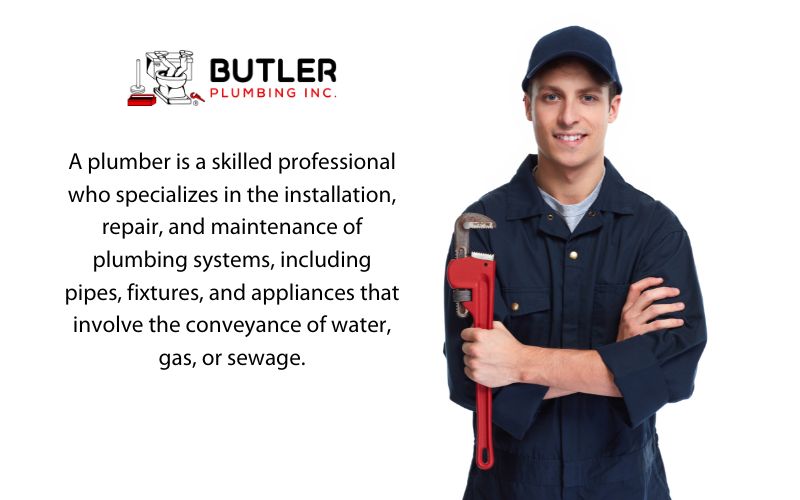Plumbing services is the installation, repair, and maintenance of water supply and drainage systems in homes, businesses, and public infrastructure. Plumbers are professional skilled tradesmen who handle various plumbing tasks, ensuring that these essential systems operate properly. Hiring a professional plumber is important for several reasons. They have the expertise to accurately assess issues and conduct repairs to restore functionality and prevent further damage. Their services are also vital for installing new plumbing systems and fixtures to high-quality standards, maximizing efficiency.
There are various types of plumbing services. Residential plumbers handle water heaters, pipes, drains, faucets, and more in homes. Commercial plumbers work in offices, restaurants, and other business settings. Municipal plumbers service the water distribution pipes and sewer lines of towns and cities. Understanding the different types of services plumbers provide can help you determine the right one to call for your specific needs.
Plumbing services play a fundamental yet often overlooked role in supplying clean water and handling wastewater and sewage. Hiring a knowledgeable plumber protects health, prevents property damage, and maintains high standards of living that depend on properly functioning plumbing.
What is the definition of plumbing?
Plumbing refers to the system of pipes, fixtures, and fittings installed in buildings to facilitate water distribution for various purposes, such as drinking, bathing, and sanitation. It also covers the drainage and disposal of wastewater.
The primary components of a plumbing system include pipes that carry water to different areas, faucets and fixtures for controlling water flow, and drainage pipes that remove used water.
Additionally, plumbing involves various devices like water heaters and pumps to ensure a reliable water supply and appropriate pressure.
What is the definition of a plumber?

A plumber is a skilled tradesperson specializing in installing and repairing plumbing systems. These systems include pipes, fixtures, and appliances that convey water, gas, or sewage in buildings. Plumbers ensure proper functioning by addressing leaks, clogs, or malfunctions.
There are different levels of expertise within the plumbing profession, including journeyman plumbers and master plumbers.
What is a journeyman plumber?
A journeyman plumber is a skilled tradesperson who has completed the necessary apprenticeship training in plumbing. After successfully finishing their apprenticeship, which typically involves a combination of on-the-job experience and classroom instruction, a plumber becomes eligible to be classified as a journeyman.
Journeyman plumbers have a solid understanding of plumbing systems, fixtures, and regulations. They are competent in installing and repairing pipes, fixtures, and appliances, ensuring proper water flow and drainage.
While journeyman plumbers have gained significant expertise, they still work under the supervision of a master plumber, who holds a higher level of certification, as they cannot yet own their own plumbing business.
What is a master plumber?
A master plumber is a highly skilled professional in the plumbing industry who has completed extensive training and acquired significant experience. Unlike a journeyman plumber, a master plumber has typically undergone additional education and practical work, often accumulating several years of on-the-job experience.
This expertise allows them to handle complex plumbing projects, supervise other plumbers, and ensure that plumbing systems meet the required safety and regulatory standards.
In many jurisdictions, obtaining a master plumber license involves passing a comprehensive exam to demonstrate proficiency in various aspects of plumbing, including installation, repair, and maintenance.
A master plumber oversees and executes advanced plumbing tasks with a deep understanding of the plumbing trade.
What are plumbing services?
Plumbing services involve the installation, repair, and maintenance of pipes, fixtures, and other components related to water supply, drainage, and gas connections in buildings.
Plumbing services include:
- Indoor plumbing
- Outdoor plumbing
- Residential Plumbing
- Commercial Plumbing
- Industrial plumbing
- Municipal plumbing
- Institutional plumbing
- Recreational plumbing
- Marine Plumbing
- Automotive plumbing
Indoor Plumbing
Indoor plumbing is the system of pipes, fixtures, and fittings that bring clean water into a building and remove wastewater. Typically found in residential, commercial, and institutional structures, indoor plumbing ensures a convenient and hygienic water supply within the confines of a building.
It includes components such as faucets, sinks, toilets, showers, and water heaters, all interconnected to deliver potable water for various domestic purposes while efficiently managing wastewater through drainage systems.
Outdoor Plumbing
Outdoor plumbing connects pipes and fixtures outside buildings to facilitate water supply and drainage in open spaces. This system is crucial for irrigation, landscaping, and outdoor cleaning.
Outdoor plumbing features include hose bibs, sprinkler systems, and drainage pipes designed to manage rainwater or excess water from outdoor areas. It maintains the outdoor environments by providing the necessary water resources and preventing water accumulation.
Residential Plumbing
Residential plumbing covers the plumbing systems within homes and other dwellings. It includes installing, maintaining, and repairing pipes, fixtures, and appliances that contribute to the distribution of clean water and the removal of wastewater within a residential structure.
This type of plumbing ensures a comfortable and sanitary living environment, covering everything from kitchen and bathroom plumbing to water heaters and sewer connections specific to individual residences.
Commercial Plumbing
Commercial plumbing pertains to the plumbing systems in non-residential structures such as offices, retail spaces, and restaurants. It addresses the unique demands of more significant buildings and increased usage, providing water supply and sewage disposal solutions tailored to the needs of businesses.
This type of plumbing system often involves more complex setups, additional fixtures, and considerations for high water demand, aiming to sustain a productive and efficient environment within commercial establishments.
Industrial Plumbing
Industrial plumbing focuses on the plumbing requirements of industrial facilities, manufacturing plants, and large-scale operations. It deals with specialized systems that handle substantial water usage, chemical processes, and specific industrial needs.
An industrial plumbing installation may include heavy-duty pipes, pumps, and filtration systems designed to meet the demands of industrial processes while adhering to safety and environmental regulations.
Municipal Plumbing
Municipal plumbing refers to the extensive network of pipes and infrastructure managed by local governments to supply water to communities and handle wastewater. This includes water treatment plants, distribution pipelines, and sewage systems that serve entire municipalities.
Municipal plumbing is vital in ensuring public health by providing clean water for consumption and efficiently treating and disposing wastewater to safeguard the environment.
Institutional Plumbing
Institutional plumbing involves the plumbing systems within public institutions such as schools, hospitals, and government buildings. This type of plumbing caters to the unique needs of these facilities, considering factors like hygiene, accessibility, and durability.
Their installations are designed to accommodate high usage and diverse requirements, ensuring a reliable and sanitary environment within public institutions.
Recreational Plumbing
This type of plumbing addresses the plumbing needs of recreational facilities such as swimming pools, spas, and sports complexes. It includes installing and maintaining specialized plumbing systems to support activities like water recreation and sports.
Recreational plumbing ensures the proper circulation, filtration, and water treatment in these facilities, maintaining a safe and enjoyable environment for users.
Marine Plumbing
Marine plumbing involves the systems aboard ships, boats, and other marine vessels. It is a specialized type of plumbing that addresses the challenges of water supply and waste management in a dynamic and confined maritime environment.
Marine plumbing installations include components like marine toilets, water desalination systems, and bilge pumps, ensuring the provision of clean water and the efficient removal of wastewater while at sea.
Automotive Plumbing
Automotive plumbing refers to the plumbing systems within vehicles, covering various fluids necessary for their operation. This includes systems for engine cooling, fuel supply, and brake fluid, among others.
An automotive plumbing system ensures the proper circulation and management of fluids to maintain the performance and safety of vehicles on the road. It involves hoses, pipes, and connectors designed to withstand the unique conditions and demands of automotive applications.
What is the importance of plumbing?
Plumbing facilitates the distribution of clean water and the removal of waste. It ensures access to safe and potable water for various household activities such as drinking, cooking, and bathing.
Additionally, plumbing systems enable efficient disposal of wastewater, preventing the spread of diseases and maintaining hygiene.
Proper plumbing is essential in residential and commercial settings, contributing to public health and environmental sustainability.
Beyond basic needs, plumbing supports various appliances like washing machines and dishwashers, enhancing overall convenience.
What is the importance of plumbing maintenance?
Plumbing maintenance helps prevent costly and inconvenient plumbing issues. Detecting and addressing minor leaks, clogs, or wear and tear early on can prevent them from escalating into major problems that may require extensive repairs.
Secondly, proper maintenance ensures the efficient functioning of plumbing systems, promoting water conservation and reducing utility bills.
In addition, routine checks on pipes, fixtures, and connections contribute to a healthier and safer living environment by preventing water damage and mold growth.
So, investing in plumbing maintenance is a practical and cost-effective approach to preserving the integrity of a home’s plumbing infrastructure, avoiding disruptions, and promoting long-term sustainability.
Why is the plumbing system important in a building?
The plumbing system is important in a building because it facilitates the distribution of clean water for various household activities such as drinking, cooking, and bathing. Without an efficient plumbing system, access to safe water would be compromised, posing health risks.
Also, the plumbing system is responsible for removing wastewater and sewage from the building, preventing the accumulation of unsanitary conditions. Proper drainage helps maintain a hygienic environment and reduces the risk of waterborne diseases.
Moreover, the plumbing system contributes to fire safety by providing water for firefighting.
So, a well-functioning plumbing system ensures the availability of clean water, sanitation, and overall safety within a building.
Why is indoor plumbing important?
Indoor plumbing ensures convenient access to clean water within homes, promoting hygiene by allowing residents to wash hands, bathe, and maintain cleanliness. This reduces the risk of waterborne diseases, contributing to overall public health.
In addition, indoor plumbing facilitates the efficient disposal of wastewater, preventing contamination of living spaces and the surrounding environment. Proper sewage systems prevent the spread of harmful bacteria and unpleasant odors.
It also enhances overall quality of life by providing a reliable and efficient means for cooking, cleaning, and personal hygiene.
Why is vent plumbing important?
Vent plumbing is crucial for maintaining a well-functioning system in homes and buildings. Its primary purpose is to allow air to enter the plumbing system, preventing negative pressure that can impede wastewater flow.
Without proper venting, draining fixtures like sinks, toilets, and showers may experience slow drainage or gurgling noises.
Additionally, vent pipes help prevent sewer gasses from entering living spaces, promoting a safe and healthy environment.
Proper venting also aids in preventing siphoning of water from traps, which creates a barrier against sewer odors.
What is the importance of plumbing in society?
Plumbing ensures the safe and efficient distribution of water and the removal of waste in society. Access to clean water is essential for human health, sanitation, and overall well-being.
Plumbing systems enable freshwater delivery to homes, businesses, and public spaces, supporting daily activities such as drinking, cooking, and hygiene.
Additionally, adequate plumbing facilitates the proper disposal of wastewater, preventing contamination and the spread of diseases.
In both residential and commercial settings, plumbing infrastructure contributes to the comfort and hygiene of individuals.
Plumbing also has a broader societal impact by promoting public health and environmental sustainability through the responsible management of water resources.
What is the importance of plumbing codes?
Plumbing codes are crucial in ensuring the safety, efficiency, and reliability of plumbing systems in buildings. These codes are established sets of regulations that dictate the standards for the design, installation, and maintenance of plumbing systems.
The primary importance lies in safeguarding public health by preventing contamination of drinking water with harmful substances. Codes also promote consistency in plumbing practices, ensuring uniformity in construction methods and materials.
Additionally, compliance with plumbing codes enhances the durability of plumbing installations, reducing the risk of leaks, water damage, and associated maintenance issues.
These regulations contribute to the overall well-being of communities by establishing a baseline for the proper functioning of plumbing systems, ultimately creating safer and healthier living environments.
What is the importance of plumbing engineering?
Plumbing engineering ensures the proper functioning and safety of water supply and drainage systems in buildings. It helps maintain public health by designing and implementing efficient plumbing systems that deliver clean water and remove wastewater effectively.
Proper plumbing engineering also contributes to water conservation, as it involves the design of fixtures and systems that minimize water wastage.
Lastly, it ensures compliance with building codes and regulations, promoting safety and preventing potential hazards.
What is the importance of plumbing fixtures?
Plumbing fixtures help maintain hygiene, convenience, and functionality within a household or any built environment. These fixtures, including sinks, toilets, faucets, and showers, provide essential utilities that contribute to the overall well-being of individuals.
Sinks enable proper handwashing and dish cleaning, promoting sanitation and preventing the spread of diseases. Toilets facilitate effective waste disposal, ensuring a clean and odor-free environment.
Faucets control water flow, allowing for efficient water usage and reducing wastage. Showers offer a convenient means of personal hygiene.
The importance of plumbing fixtures lies in their ability to fulfill basic human needs, enhance living standards, and promote a healthy and comfortable lifestyle.
Without these fixtures, daily tasks related to hygiene and sanitation would be considerably compromised, negatively impacting both individual well-being and overall community health.
What is the importance of plumbing tools?
Plumbing tools ensure the proper functioning and maintenance of water and sewage systems in homes, businesses, and other structures. These tools are essential for various tasks, such as repairing leaks, unclogging pipes, and installing new fixtures.
Wrenches, pipe cutters, and pliers are fundamental for adjusting and securing pipes, while plungers and snakes help clear blockages efficiently. Tapes and sealants are vital for preventing leaks and ensuring watertight connections.
Overall, plumbing tools enable professionals and DIY enthusiasts to address plumbing issues effectively, contributing to the reliable and efficient operation of plumbing systems, which is essential for the health and safety of occupants and the integrity of the infrastructure.



